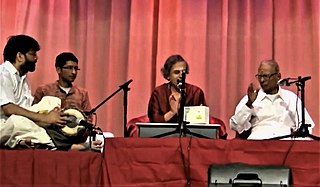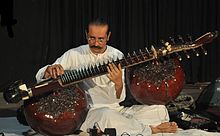Dhrupad is a genre in Hindustani classical music from the Indian subcontinent. It is the oldest known style of major vocal styles associated with Hindustani classical music, Haveli Sangeet of Pushtimarg Sampradaya and also related to the South Indian Carnatic tradition. It is a term of Sanskrit origin, derived from dhruva and pada. The roots of Dhrupad are ancient. It is discussed in the Hindu Sanskrit text Natyashastra, and other ancient and medieval Sanskrit texts, such as chapter 33 of Book 10 in the Bhagavata Purana, where the theories of music and devotional songs for Krishna are summarized.
Zia Mohiuddin Dagar, , was a North Indian (Hindustani) classical musician, one of the 19th generation of Dagar family dhrupad musicians. He was largely responsible for the revival of the rudra vina as a solo concert instrument.

Pandit Bhajan Sopori was an Indian instrumentalist. He was a player of the santoor, an ancient stringed musical instrument.
Zia Fariduddin Dagar was an Indian classical vocalist belonging to the Dhrupad tradition, the oldest existing form of north Indian classical music. He was part of the Dagar family of musicians.
Pandit Ritwik Sanyal is an Indian classical singer and the Dhrupad maestro from Varanasi. He is a retired professor and Ex Dean from the department of vocal music at the faculty of performing arts at Banaras Hindu University. On 5 April 2023, Pandit (Dr.) Ritwik Sanyal was conferred the Padma Shri award for 2023 in recognition of his outstanding contributions to the revival and propagation of the Dhrupad tradition, both as an academician and performer. A recipient of the esteemed Kendriya Sangeet Natak Akademi award in 2013, presented by the then Hon. President of India, Pranab Mukherjee, Pandit Ritwik Sanyal has now received the 4th highest civilian award, the Padma Shri, from President of India, Droupadi Murmu.

The Gundecha Brothers are Indian classical singers of the dhrupad genre of the Dagar vani. From 1985 to 2019 the duo consisted of brothers Umakant Gundecha and Ramakant Gundecha and were awarded the Padma Shri for art for 2012. Following the death of Ramakant Gundecha in 2019, his son Anant began to perform with Umakant in the Gundecha bandhu.
The Sangeet Natak Akademi Fellowship, also known as Akademi Ratna Sadasyata, is an Indian honour for the performing arts presented by Sangeet Natak Akademi. It is "the most prestigious and rare honour" conferred by the Akademi and is "restricted to 40 individuals at any given time".

Rudrapatna Krishnashastri Srikantan, known as R. K. Srikantan, was a vocalist of the Carnatic musical tradition of South Indian music. He was awarded the Madras Music Academy's Sangeetha Kalanidhi in 1995.
Ustad Nasir Aminuddin Dagar, of Dagar Gharana of Dhrupad singing was an Indian dhrupad singer in the dagar-vani style, the second-eldest among four Dhrupad singing brothers.

Asad Ali Khan was an Indian musician who played the plucked string instrument rudra veena. Khan performed in the style dhrupad and was described as the best living rudra veena player in India by The Hindu. He was awarded the Indian civilian honor Padma Bhushan in 2008.
Pandit Uday Bhawalkar is an Indian classical vocalist. He is an exponent of the dhrupad genre.
K. S. Narayanaswamy, was a Carnatic veena exponent of the Thanjavur style, in which nuances and subtleties are given more importance over rhythm based acrobatics. He was awarded the Madras Music Academy's Sangeetha Kalanidhi in 1979.
Rahim Fahimuddin Dagar was an exponent of Dagar vani Dhrupad of Indian classical music. He represented the 19th generation of Dagar Tradition. His cousins Nasir Moinuddin Dagar and Nasir Aminuddin Dagar were known as the Senior Dagar Brothers. Similarly, Nasir Zahiruddin and Nasir Faiyazuddin Dagar were known as the Junior Dagar Brothers. His other cousins were Zia Mohiuddin Dagar, Fariduddin Dagar, and H. Sayeeduddin Dagar.
The Dagar vani is a tradition of the classical dhrupad genre of Hindustani classical music spanning 20 generations, tracing back to Swami Haridas, and including Behram Khan of Jaipur (1753-1878). For some generations its members were associated with the courts of Jaipur, Udaipur, and Mewar.

Shanno Khurana is a noted Indian classical vocalist and composer, from the Rampur-Sahaswan gharana of Hindustani classical music. A disciple of the doyen of the gharana, Ustad Mushtaq Hussain Khan, she is known for performing rare bandish and raag, though her singing style includes genres like khayal, tarana, thumri, dadra, tappa, to chaiti and bhajan. Born and brought up in Jodhpur, she started singing on All India Radio in 1945 in Lahore, later shifted to Delhi, where she continued her singing on All India Radio, Delhi and in concerts and music festivals. She also pursued music education, finally earning her M.Phil. and PhD in music from the Kairagarh University, and has undertakes extensive research on folk music of Rajasthan.

Karaikudi Sambasiva Iyer was noted Indian classical musician and Veena player.
Pandit Hindraj Divekar was a virtuoso of the Rudra Veena and Sitar. He teaches the been in both Dhrupad and Khayal styles. Pandit Hindraj is one of the very few surviving rudra veena players in the world. He is the co-author of the book, Rudra Veena: An Ancient String Musical Instrument. He is the founder director of Hindgandharva Sangeet Academy, Pune.
Asit Kumar Banerjee is one of the few remaining rudra veena players in India. He is the disciple of Zia Mohiuddin Dagar, and can play both Sitar and rudra veena. He was the head of the Department of Instrumental Music in The Anand Foundation, Punjab, and has performed many rudra veena concerts both in India and abroad.

Jatin Goswami is an Indian dancer and choreographer, known as one of the prominent exponents of the classical dance form of Sattriya. He is the founder director of Sattriya Akademi, Guwahati, a sitting member of its Advisory Committee, and a former member of the General Council of the Sangeet Natak Akademi. He is also the founder of Alok Shilpi Sangha, a dance academy and Pragjyoti Kala Parishad, a cultural organization, and is a recipient of the 2004 Sangeet Natak Akademi Award. The Government of India awarded him the fourth highest civilian honour of the Padma Shri, in 2008, for his contributions to Sattriya dance.

PanditRamhari Das is a leading singer, composer, musicologist and Guru of Odissi music. Known for his renditions, compositions, lecture-demonstrations and writings, Das has served as a professor and led the Odissi vocal department in prominent musical institutions of Odisha, including the Utkal Sangeet Mahavidyalaya and the Utkal University of Culture. He is the founder of Ramhari Das Odissi Gurukula at Biragobindapur, Puri. For his contributions to Odissi music, Das received the Sangeet Natak Akademi award in 2008.








